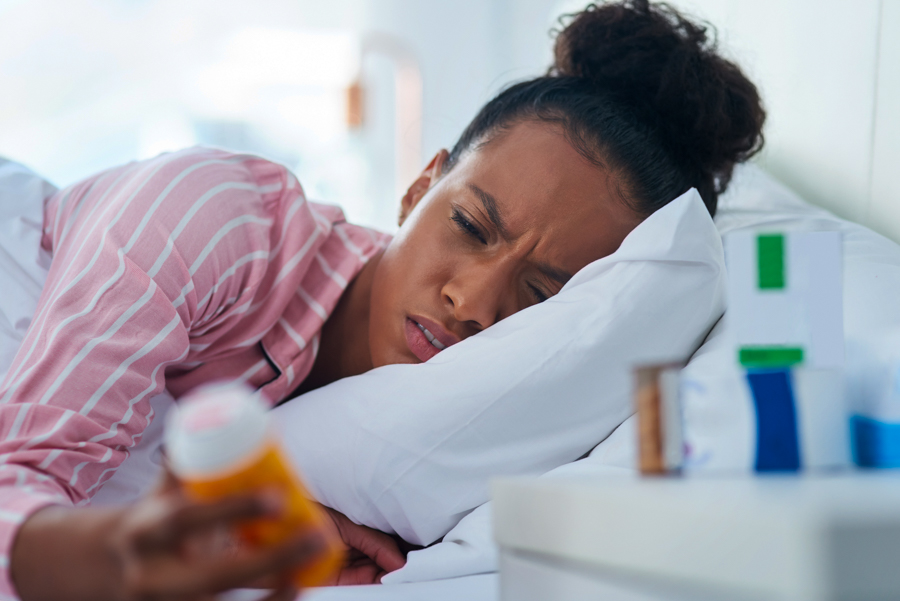Prescription Drug Addiction Treatment in Maryland

Prescription drug addiction has become a major issue in the state of Maryland, affecting individuals from all walks of life. The misuse and abuse of prescription drugs can have devastating consequences, both on an individual’s health and on their relationships with loved ones. Fortunately, there are intensive treatment options in Maryland for those struggling with prescription drug addiction.
Our behavioral health services offer hope and healing for those seeking recovery. Don’t hesitate to start on the path to healing today.

What is Prescription Drug Addiction?
Prescription drug addiction is a chronic, relapsing disorder characterized by compulsive use of prescription medications despite negative consequences. This type of addiction can develop gradually as a person becomes dependent on the calming or euphoric effects of certain prescription drugs. It can also occur suddenly due to an individual’s desire to self-medicate for physical or emotional pain.
Various types of prescription drugs can be addictive, including opioids, depressants, and stimulants. These medications are often prescribed to treat legitimate medical conditions such as pain, anxiety, or ADHD. However, when misused or abused, they can lead to physical and psychological dependence.
One of the dangers of prescription drug addiction is that people may underestimate the potential for harm because these medications are legally obtained from a doctor. They may also mistakenly believe that prescription drugs are safer than illegal drugs. However, these substances can still cause serious side effects and complications when not taken as directed.
For those struggling with prescription drug addiction, our adult addiction treatment in Maryland can help. Quitting these drugs suddenly without proper medical supervision can also be dangerous and potentially life-threatening.
All prescription drugs should be taken only as directed by a healthcare professional. If you or someone you know is struggling with prescription drug abuse, consider our intensive outpatient program in Maryland. With proper treatment and support, recovery from prescription drug abuse is possible.
Signs and Symptoms of Prescription Drug Addiction
One of the first signs of prescription drug addiction is an increased tolerance to the medication. This means that over time, a person will need higher doses of the drug to feel its effects.
If someone stops taking their prescription medication suddenly, they may experience withdrawal symptoms such as nausea, headaches, and anxiety. These symptoms can be intense and may lead to relapse if not properly managed.
Another sign of prescription drug addiction is when a person becomes preoccupied with obtaining and using the medication. They may constantly think about it and go to great lengths to get more of it, even if it means lying or stealing.
Prescription drug addiction can also cause physical changes in a person’s appearance. They may have sudden weight loss or gain, changes in skin tone or complexion, and red or glazed eyes.
People struggling with prescription drug addiction may experience mood swings that are out of character for them. They may become irritable, agitated, or even aggressive when they are unable to access their medication.
As addiction takes hold, a person’s priorities often shift towards obtaining and using drugs rather than fulfilling their responsibilities at work, school, or home.
Prescription drug addiction can also cause financial strain as individuals may spend excessive amounts of money on obtaining more drugs or miss work and lose income due to their substance use.
Addiction can strain relationships with family members, friends, and romantic partners as individuals prioritize their substance use over maintaining healthy connections with others.
In some cases, people struggling with prescription drug addiction will visit multiple doctors to obtain multiple prescriptions for the same medication.
Perhaps the most significant sign of prescription drug addiction is when a person continues to use despite experiencing negative consequences. This indicates that the individual has lost control over their substance use and may require treatment such as cognitive behavioral therapy (CBT) in Maryland.
Risk Factors of Prescription Drug Addiction
People with a family history of substance abuse or addiction are more likely to develop an addiction to prescription drugs.
Individuals with mental health disorders may be more susceptible to developing an addiction as they may use drugs as a coping mechanism. Our dual diagnosis treatment center in Maryland addresses addiction along with any co-occurring mental health disorder.
People who suffer from chronic pain may be prescribed painkillers and end up becoming dependent on them.
Certain age groups, such as teenagers and older adults, may be at a higher risk of developing an addiction to prescription drugs due to factors like peer pressure or accessibility.
Individuals who have previously struggled with substance abuse are at a higher risk of developing an addiction to prescription drugs.
When Should I Seek Prescription Drug Addiction Treatment?

If you are struggling with prescription drug addiction, it is important to seek treatment as soon as possible. Here are some signs that indicate it may be time to seek prescription drug addiction treatment:
- You have developed a tolerance to the medication and need higher doses to achieve the same effects.
- You experience withdrawal symptoms when you try to stop taking the medication.
- You spend a significant amount of time thinking about or trying to obtain more medication.
- You continue taking the medication despite negative consequences such as relationship problems, financial difficulties, or health issues.
- You have tried unsuccessfully to quit on your own.
- Your use of the medication is affecting your daily life and responsibilities.
- Loved ones express concern about your use of prescription drugs.
If any of these apply to you, our outpatient mental health center in Maryland can help you start on the path to recovery. Remember, seeking help is not a sign of weakness but rather a brave and necessary step towards recovery.
Therapy for mental health in Maryland is a crucial component of outpatient treatment for prescription drug addiction. These therapy sessions can be individual or group sessions and are led by a licensed therapist. The goal of therapy is to address the underlying issues that may have led to the addiction and develop coping mechanisms to avoid relapse.
Support groups, such as Narcotics Anonymous (NA) or SMART Recovery, provide individuals with a supportive community of people who understand what they are going through. These groups offer a safe space for individuals to share their experiences and receive support from others who have also struggled with prescription drug addiction.
Medication management is another important aspect of outpatient treatment for prescription drug addiction. Medications may be prescribed by a doctor to help manage withdrawal symptoms or reduce cravings. These medications can include buprenorphine, naltrexone, or methadone.
Receive Addiction Treatment at Elevated Wellness
Don’t let addiction control your life any longer. Contact us today to learn more about our addiction treatment program in Maryland. It’s never too late to start your journey towards lasting recovery.





